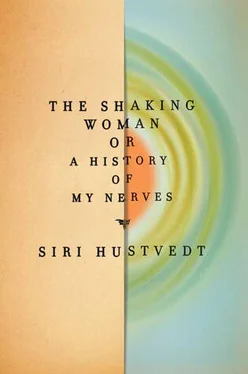There is some general agreement, however. Conversion symptoms often mimic neurological symptoms: paralyses; seizures; difficulty walking, swallowing, or speaking; blindness; and deafness. But when a neurologist investigates, he won’t be able to find anything that would normally cause these problems. So, for example, if some wandering neurologist had happened to give me an EEG while I was shaking in front of the tree, hysterical convulsions wouldn’t have been recorded on it, but epileptic shudders might have been. At the same time, hysterics are not malingerers. They can’t help what’s happening to them and aren’t faking their illnesses. Also, the symptoms can and often do resolve themselves spontaneously. The big caveat is that, as the DSM authors note, “Caution must be exercised.” 6In other words, if I had gone to a psychiatrist he would have had to be careful about me. An unidentified neurological illness might have been hiding under my symptoms that wouldn’t show up on any tests. He’d have to be confident that my shakes were too odd for epilepsy before he made the diagnosis. And the problem goes both ways. Carl Basil, a pharmacologist at Columbia University, tells the story of a patient who watched the place where he worked burn down and “suddenly became paralyzed on the right side as if he had a stroke.” 7In fact, the man had had a “conversion reaction,” which vanished with his shock. The issue is further riddled by the fact that people who suffer from epilepsy are far more likely to have hysterical seizures than people who do not have the disease. In one paper I read, the authors stated that between 10 and 60 percent of people with psychogenic nonepileptic seizures (PNES) have comordid epilepsy. 8This contemporary dilemma of identification sounds a lot like the difficulties physicians have had throughout the ages separating epilepsy from hysteria. The question has always been, A woman is shaking. Why?
For years in the late twentieth century, physicians blithely threw around the phrase “no organic cause.” Hysteria was a psychic illness with no organic cause. People found themselves paralyzed, blind, and convulsing without any organic cause? How could that be? Unless you believed that ghosts, spirits, or demons swooped in from heaven or hell to take control of a person’s body, how could it be argued that this wasn’t an organic, physical phenomenon? Even the current DSM acknowledges the problem, stating that the difference between mental and physical is “a reductionistic anachronism of mind/body dualism.” 9That split has been with us in the West at least since Plato. The idea that we are made of two stuffs, not one, that mind isn’t matter, continues to be part of many people’s thinking about the world. Certainly the experience of living in my own head has a magical quality. How do I see and feel and think, and exactly what is my mind? Is my mind the same thing as my brain? How can the human experience originate in white and gray matter? What is organic and nonorganic?
Last year, I heard a man talking on the radio about life with his schizophrenic son. Like many patients, his son had trouble staying on his medicine. After hospitalizations, he would return home, stop taking the drug he had been prescribed, and collapse again. It’s a story I’ve heard often from the patients I teach in the hospital, but with each person the reasons for going off the medicine are different. One patient got horribly fat from an antipsychotic, and it made him miserable; another felt dead inside; another was furious with her mother and stopped out of spite. The father on the radio made a point of saying, “Schizo phre nia is an organic brain disease .” I understood why he said it. No doubt his son’s doctors had told him this or he had read articles about the illness that referred to it in this way, and it comforted him, made him feel that as a father he was not responsible for his child’s illness, that the boy’s environment had played no role. The genetic mystery of schizophrenia may one day be solved, but for now it remains unknown. If one identical twin suffers from the disease, there’s a 50 percent chance that the other will. That’s high but not determining. There have to be other factors at work, environmental factors, which might be anything from poisons in the air to parental neglect. Too often, people prefer easy answers. In the current cultural climate, organic brain disease has a reassuring sound. My son isn’t mad; he has something wrong with his brain.
But there is no quick route out of the psyche/soma trap. Peter Rudnytsky, a prominent scholar of psychoanalysis, discusses Otto Rank, a psychoanalyst in Freud’s circle, who probably suffered from manic depression. He notes that because manic depression is now known to be an “organic” illness, Rank’s mood swings can’t be construed as a taint on his “character.” 10Manic depression, also known as bipolar disorder, does run in families, and the genetic component seems to be considerably higher than in schizophrenia. And yet, Rudnytsky implies that there are nonorganic states that might be attributable to character flaws. This raises a question: What is character? Isn’t character the sum of our parts, and aren’t those parts organic? And if not, what is psychic and what is somatic?
The problem is that the phrase organic brain disease doesn’t mean much. There are no lesions or holes in the brain tissue of schizophrenics or manic-depressives, no virus eating away at their cortices. There are changes in brain activity that can be detected by the new technology of brain scans. But then there are brain changes when we are sad or happy or lustful, too. All of these human states are physical. And what is a disease exactly? In Campbell’s Psychiatric Dictionary , I found this remark from Culver and Gert’s Philosophy in Medicine : “Illness and disease are closely related, but diseases are ontologically more robust than just an illness.” 11A disease, in other words, has more there there, more being than an illness. Not long ago, a friend of mine showed me a book called Living Well with Migraine Disease and Headaches . I was amazed. In my earlier travels from one neurologist to another, migraine was never referred to as a disease . Obviously it had gained new status, had attained a more “robust” existence since 1982. Is conversion disorder, unlike schizophrenia or manic depression, a psychic phenomenon? Is a psyche different from a brain?
Sigmund Freud was the first to use the word conversion in the book he published with Josef Breuer, Studies on Hysteria (1893): “For the sake of brevity, we adopt the term ‘conversion’ to designate the transformation of psychical excitement into the chronic somatic symptoms, which is so characteristic of hysteria.” 12What did Freud mean by this? Did he believe that psychical excitement was a nonbiological entity? Freud was a man steeped in the philosophy and science of his time. As a medical student, he pursued his degree but took additional classes in philosophy and zoology. In the summer of 1876, Freud received a grant to go to the Zoological Experimental Station at Trieste, where he spent his time dissecting eels, studying their histological structure, and looking for testes that no one had ever been able to find. It seems that the gonadic structure of eels had been puzzling interested parties since Aristotle. Freud’s results were inconclusive, but his research was part of the journey that would eventually end with an answer to the question. After three years of medical school, he settled on neurology as his main interest and spent six years studying nerve cells in the physiology laboratory of Ernst Wilhelm von Brücke. He concentrated on the visible material of the nervous system. The first book Freud published was On Aphasia: A Critical Study . Aphasia — the word is derived from the Greek for “speechless”—refers to language problems in patients who have brain damage. Every aspect of language can be affected. Some patients understand words but can’t produce them. Some can’t comprehend what is being said to them or can’t register whole sentences. Others know what they want to say but can’t retrieve the phonemes to utter it. Although not given great attention at the time, much of what Freud argued in that book remains valuable. He insisted that although brain processes could be localized — certain parts of the brain were responsible for different human behaviors, such as language — they were not static but were dynamic moving pathways in the brain. This is unquestionably true. His position on the connection between mind and matter was subtle. He was neither a reductionist nor a dualist: “The psychic is, therefore, a process parallel to the physiological, a dependent concomitant.” 13Freud remained a materialist all his life. He did not truck with misty notions about souls, spirits, or psyches detached from physical processes. One depended on the other. At the same time, following Kant, he did not believe that it was possible to know things-in-themselves. Our access to the world comes only through our perceptions of it, he argued. And yet, I’m always running into people who treat Freud almost as if he had been a mystic, a man whose ideas bear no relation to physical realities, a kind of monster of mirage who derailed modernity by feeding all kinds of nonsense to a gullible public until his thought was finally shattered by a new scientific psychiatry founded on the wonders of pharmacology. How did a scientist acquire this reputation?
Читать дальше












